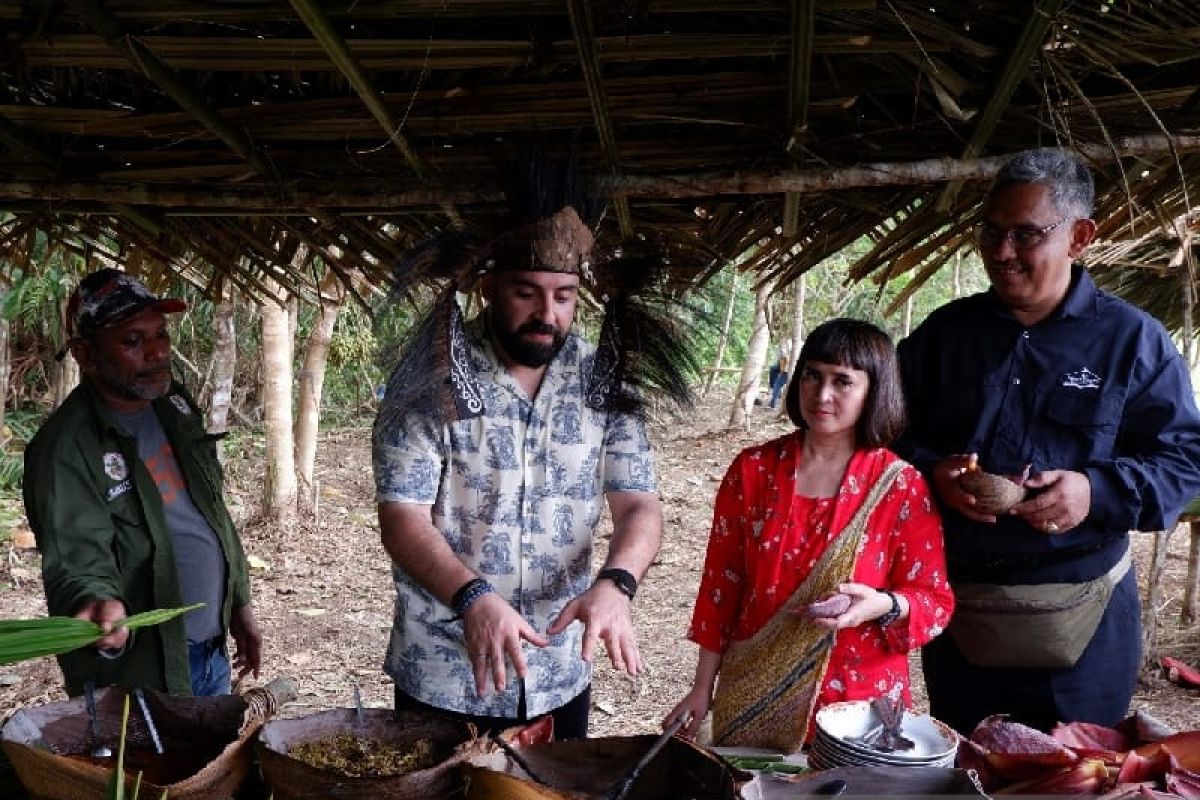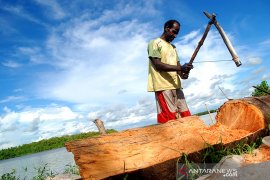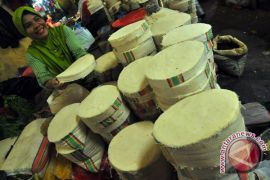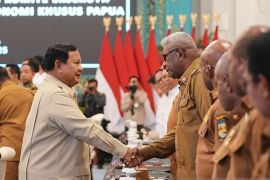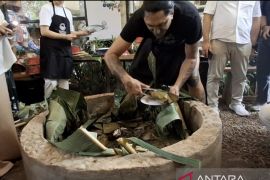Eating sago caterpillars is a valuable experience, which cannot be obtained anywhere else (except in Papua).Jayapura, Papua (ANTARA) - Papua became the first destination of Qatari chef Hassan Al Ibrahim in exploring Indonesia's culinary delights as part of Qatar-Indonesia 2023 Year of Culture, an international cultural exchange event initiated by Qatar Museums.
He visited Skouw Sae Village, Muara Tami Sub-district, Jayapura City, Papua Province, which is located near the border of Indonesia and Papua New Guinea on Wednesday (June 21, 2023).
The community welcomed him with the traditional Wiru dance that is performed to greet guests.
The chef was introduced to several local edibles, including coffee, tubers, papeda -- a porridge made from sago starch used as staple food for people in various eastern regions of Indonesia -- as well as sinole that is roasted sago starch and grated coconut.
Papuan dishes are mostly cooked using simple techniques of grilling and smoking without oil and only adding a little salt.
On the occasion, Ibrahim also saw the making of papeda, starting from cutting the sago palm to take its pith, which is the spongy core tissue of a tree.
While waiting for people to finish extracting the pith, he was challenged to eat sago caterpillars alive.
The insects are usually found in a rotten stem of the sago tree. There were small to adult thumb-sized caterpillars.
The Qatari chef admitted to being surprised by the challenge, and it was his first time trying it. He noted that it had a sweet and savoury taste with a chewy texture, and it was quite delicious.
"Eating sago caterpillars is a valuable experience which cannot be obtained anywhere else (except in Papua)," he admitted.
Furthermore, Ibrahim and several Papuan women squeezed the palm pith to separate water from the sago starch that will be dried later.
Ibrahim said he was pleased to witness first-hand the process of making sago starch.
He also joined several people preparing a stone furnace to cook the sago. It is a cooking method carried out by heating several stones for about two hours and then placing the food on top of the stones.
The people cooked the dried sago starch into papeda by adding water to produce a glue-like porridge. They also cooked several side dishes, such as pork, tubers, and vegetables.
While eating the papeda, the Qatari chef noted that sago was a unique staple food and admitted to have never come across such food with the same texture as papeda.
He remarked that the Papuan native cuisine with stir-fried banana and papaya flowers as well as fish in yellow broth tasted delicious.
The chef said that he could also find sago-based cuisine in Qatar, though the texture is different from the one he found in Papua.
A sago-based dish in Qatar, which is a type of pudding called sago halawa, is cooked with rose water, cardamon, saffron, and sugar – very different from papeda that is only cooked with water and salt.
Ibrahim said he will attempt to create a sago-based dish in future by using various ingredients available in his country of origin.
Related news: Qatari chef visits Papua to observe sago making
Introducing local food
Charles Toto, founder of a local chef community in Papua called The Jungle Chef, said he felt proud to have a chef from Qatar witness and participate in the making of sago as well as enjoy the papeda.
Toto expects more international cultural visits to be made in future, so Papuan native food can become popular in the world.
He said that the Qatari chef's visit marked a historical moment since it coincided with the 7th commemoration of Sago Day observed every June 21.
The Jungle Chef founder also expressed hope that sago would become an alternative national staple food in Indonesia to help strengthen the country’s food security.
Rice is the main staple food in Indonesia, while corn, sorghum, and cassava usually serve as alternative foods. Hence, Toto expects that sago can also become a popular food in the nation.
There are 18 types of sago in Papua with their own textures and usages.
Cultural exchange program
Indonesia has been selected as partner for the 2023 Year of Culture due to its cultural wealth and distinctiveness, Indonesian Ambassador to Qatar Ridwan Hassan affirmed.
It is the first country in Southeast Asia to be chosen as partner country for the event.
Aku Cinta Makanan Indonesia (ACMI) -- literally meaning I Love Indonesian Food -- was elected as the partner for implementing the Culinary Journey Program of the Qatar-Indonesia 2023 Year of Culture.
The community chose Papua for the program since it noted that 70 percent of Indonesia’s natural wealth can be found there.
ACMI, a community aiming to preserve, record, develop, and disseminate the wealth of Indonesia's traditional cuisine, also selected Medan and Bali as the next destinations for the program.
Another reason behind the community holding the Culinary Journey Program in Papua was since the region has diverse local food, especially sago. ACMI is also aimed at preserving the wealth of sago-based dishes.
Apart from showing the making of papeda to the Qatari chef, ACMI also brought Ibrahim to hold a cooking demonstration of several Qatari cuisines for the students of Jayapura 1 Public Vocational High School (SMK) taking the culinary arts class on Thursday (June 22).
He also introduced several spices to the students. The event aimed at encouraging the students to continue to make creative recipes.
Through this Culinary Journey Program, chefs from Papua and Qatar could share their cooking experiences with one another, so it is expected that a new dish combining traditional Papuan and Qatari flavours can be created in future.
Food, one of the basic necessities of humans, has proven to be able to become a means of diplomacy to strengthen cooperation between the two countries through the Qatar-Indonesia 2023 Year of Culture.
Related news: Indonesia, Qatar collaborate to launch children's storybooks
Related news: Strengthening Indonesia-Qatar friendship through culture
Translator: Qadri Pratiwi, Uyu Liman
Editor: Yuni Arisandy Sinaga
Copyright © ANTARA 2023
